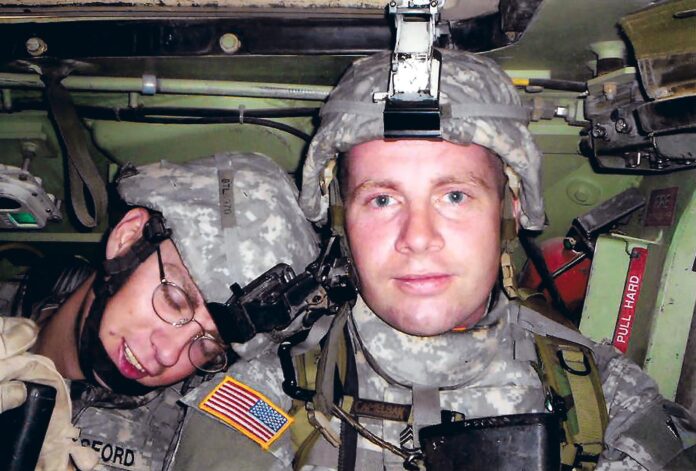OVER the course of a 45 minutes conversation on a Friday afternoon, Ray Leyden stresses that he feels lucky, feels blessed, that the United States has been good to him, that he thrived in its military, that business and life on the far side of the Atlantic are going very well.
He describes himself as a ‘glass half full’ type of person and that outlook has stood to Ray since he emigrated to New York as a teenager, where he built a career and life.
As a young man he worked on construction sites all across the Big Apple, before joining the US military just weeks before 9/11. He would go on to see action in Iraq, being among the first US soldiers to cross the border. With distinguished service behind him, Ray would go back to college afterwards and since 2018 he has been running his own financial services company, Feninal Capital Strategies.
Back in the autumn of 1994, just before the Irish economy began to emerge from years of stagnation, Ray left his native Tulla, beginning a new life on the other side of the Atlantic. “I finished the Leaving Cert in June, I was working in Vaughan’s in Tulla and at the time Ireland was still like it had been in the 80s, there really wasn’t a lot of opportunity. I remember my brother who’s a carpenter, he had to basically pay his own way for his apprenticeship, or else he wasn’t getting an apprenticeship. This is just prior to the Celtic Tiger, I was the youngest of eight kids, most of them were in the US at the time, so it was always the plan for us to go to the US. It probably wasn’t the plan to stay in America, half of my siblings live back there (Ireland) but they all lived here (America) for a few years.”
At the time there were a huge amount of people from around East Clare in an Irish enclave of the Bronx, and it was something of a home from home as he began working in construction and playing hurling and football for Clare teams in his time off.
Military
He was following a fairly well trodden path, when he veered off into a rather unique direction in the late summer of 2001, telling his family he was joining the army. “I had started off working in construction and did that for a few years, I worked all over New York, Brooklyn, Harlem, did a lot of city work and a few years into that I decided to join the army.which was quite the conversation with my siblings. They said ‘you’re never going to do that, you can’t stand people telling you what to do’. But sure most people can’t stand anyone telling them what to do in fairness!” he laughs.
Was he not worried about the risk, given that he was joining a force that tends to be involved in warfare every few years? “To be honest I never really saw that side of it, I never thought I was really putting myself at risk. It was something I always wanted to do ever since I was a kid. I grew up watching the Saturday matinee, John Wayne would have been horsing people around the place. That was kind of a big influence on me, a very romantic idea!”
He really felt that if he didn’t go at the time he did, life would intervene and make it impossible to do so in the future. Now, looking back almost 20 years later, he is sure it was the right decision and was really the makings of him. “There’s certain things you can do in your twenties, that when you get married and have other responsibilities you just can’t do. All those other jobs would have been there, construction, those things, they weren’t going anywhere, but I had this small window and it was getting smaller, and if I didn’t go then I wouldn’t have been able to go. But I can tell you, it was absolutely the best life decision I ever made.”
He joined just weeks before 9/11 plunged America into crisis, leading to two foreign wars beginning within 18 months and Ray and his fellow recruits knew the training they were being put through was going to be tested in the near future.
Most people can remember where they heard about the planes hitting the Twin Towers and having been a new recruit to the US army at the time, Ray certainly can. “I was in it (the military) a month and I can still remember I was doing bayonet training. We were all called back, they told everyone that 9/11 had happened. They were very good, up until that point you couldn’t have phone access or email access, it’s a very controlled environment, They said if you’re from New York step forward, if you have family in the city you had use of the phones and that kind of stuff. After the initial shock of what had happened our cadre, which is the leadership, sat us all down and said ‘look, this time next year you guys are all going to be in a foreign country.’ They knew. They’d gone through that before, these are very seasoned and experienced soldiers. The training had a very different feel to it then.”
Iraq and Eddie Lenihan
He was part of the force involved in the initial push into Iraq, and they drove all the way from Kuwait to Baghdad. “When we got to the Iraqi border they had this huge ditch dug, I can still remember it very clearly, it was probably 50 yards wide and 50 yards deep and there were rows and rows of concertina wire, maybe 25 feet high. But the engineers turned up and in 20 minutes they had a bridge across it.”
It was on Ray and his colleagues to deal with the resistance once the border had been breached. “It was kind of sporadic stuff, it’s not like the movies, there’s a lot of nervous energy, that’s how I’d describe it.”
He says that no one can know how they will react when they come under fire, and he praises the training he had received for his survival. “That is what kept me alive, there’s no doubt about that. A lot of it is muscle memory. And you’re with the best trained soldiers in the world by far. It’s not like you’re there by yourself.”
After reaching Baghdad he was obviously in a very alien and dangerous environment, but all of a sudden memories of home were awoken. “I’ll tell you something funny. In my first tour in Iraq I ended up in Baghdad in an operations spot called Operations Beach. We called it Op Beach because it was a sandy inlet on the river at one of the old Ba’ath party resort houses. I’m there with a good friend of mine Will Neville, and we’re listening to BBC Radio, that’s the only radio we have, there are no cell phones or that kind of thing. And do you know who comes on the radio? Eddie Lenihan. Eddie, telling a story as only he can about the púca or something. It’s funny, I was probably never as far away from home as I was there, I was the only Irish guy around and there was Eddie Lenihan talking on the radio to me. And I went to school with Eddie’s son and I was taught by Eddie Lenihan’s wife, Mrs Lenihan!”
Now the Leyden family have a number of Eddie’s books, while his three children have been read to from them, and all of them were told of how Ray ended up listening to Eddie, thousands of miles from home, in a war zone.
Most people would be familiar with seeing US soldiers passing through Shannon Airport, and Ray was once one of them, and he remembers a Tulla woman working there giving him “bags of stuff” for the plane ride ahead.
Survivor’s guilt
While he managed to come through warfare alive, when he got back to New York, he did face real challenges in readjusting to civilian life.
“I would say the most difficult thing to deal with was the after effects, after I left the military, after I got back. You get all the training for going there, all the training for combat and initiating combat, how to react in combat, but nobody gives you any training for what to do afterwards.
“You come back, you’re all back, whoever made it back, some folks didn’t make it back, and that’s when it can start to go a little sideways. I was very lucky, I had a great family, tremendous support, the only thing I would have had difficulty with was things like survivor’s guilt, but I was able to turn that into a very positive thing, that I would honour my fallen comrades by doing the best that I could. And I didn’t want to be a cliche, I didn’t want to be that fella down at the end of the bar telling stories about when he was in the military.”
What he was dealing with is different to Post Traumatic Stress Disorder. “I guess PTSD would be more related to a specific incident that causes some kind of trauma. The survivor’s guilt is more along the lines of why did I make it out, why didn’t they make it out. That kind of stuff, it goes back to what you want to do with your life then. Do you want to be a cliche? Nobody would fault you for not reaching your potential, but you’re a leader, you take your duty and responsibility seriously. Just because you leave the military doesn’t mean your mindset switches off, that’s not really how it is. You have a duty and a responsibility and it makes it easier for you to prioritise stuff.”
Back to education
Part of how he has coped is by being determined to make the very most of the life he was lucky to come out of combat with.
After leaving the military and coming back to New York he went against the grain once more, going back to college and earning a degree in Science and Economics from Manhattan College.
He began working for an insurance company after graduation, but felt that the clients weren’t getting everything they needed from him. “The clients I was working with, I realised a lot of them were under-served. A lot of them were Irish people, Irish business owners and they wouldn’t have had very simple stuff that could have impacted them over the long term.”
His company, Fenian Capital Strategies, now does a lot of strategic consultancy and long term planning for their clients.
Ray established it in 2018, and he says he is surprised with how strong its growth has been. ” I think 80% of all companies fail in the first three years, but we just went from strength to strength to strength.”
While Covid has been a huge disruptor of the economy in New York, Ray feels it probably helped his business, highlighting to the demographic Fenian Capital Strategies serves, why they need the kind of services it provides.
Home is in Westchester, part of the New York metropolitan area. .”We’ve very fortunate, we’re very blessed. I’m married to a great woman from Virginia, we have three beautiful kids, we’re very lucky.”
His home in Westchester leaves him with a very doable commute to Manhattan. ” It’s about 25 minutes by train to Midtown Manhattan. There’s not as much greenery as we would like, but we have a very nice modest house, a large yard, those kind of things. Right now it suits us very well, if we moved another 20 minutes up you’d get a lot more space, a lot more bang for your bus but then it’s 45 minutes. It goes back to maximising your opportunities and your time, and if you’re spending an hour and a half commuting, you’re not really getting that.”
His own path
Undoubtedly Ray has lived a full life, and in more than 25 years in America has managed to be successful on his own terms, following his own path. He says that his parents have been a huge influence on him and he is clearly grateful. “My mother just turned 85 and without her nothing would have been possible. My parents have been a huge influence on my life, no matter where I was you could always go home. You don’t realise a lot of people don’t have that until they get older.”
He also remembers getting a piece of advice from a man called Noel Firth, which he feels emigrants should live by for their own good. “He told me the key to success in America is you have to make up your mind, you’re either staying or you’re going. If you’re staying, do things that will benefit you for staying, join the cops, join the fire department, buy a house, these kind of things. Commit to it. If you’re going, save as much money as you can and leave in the next 18 months. Give yourself a hard date. And you’ll be a lot better off. Written goals always have a greater likelihood of getting accomplished. I’ve been very fortunate in that there have been a couple of really key pieces of wisdom that were afforded to me by people that I have a lot of respect for.”
Over the course of his life he hasn’t been afraid to follow his own course, at eschewing conventional wisdom on what he should do, and he feels that people do need to be true to themselves and what they believe. “I think everybody has a moral compass, right? And if you follow your moral compass you can’t go too far wrong.”
Having had the experiences he had in combat, and been one of those who came through the war in Iraq, he does appreciate the importance of the need to make the most of life. “I feel like I have an obligation to do the best I can.”
Owen Ryan
Owen Ryan has been a journalist with the Clare Champion since 2007, having previously worked with a number of other publications in Limerick, Cork and Galway. His first book will be published in December 2024.




